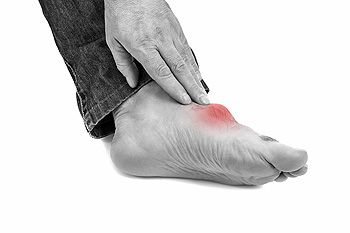NJ (908) 688-5577
NY (212) 737-2528
 Gout is a type of arthritis that can cause sudden pain in the joints. The most commonly affected areas are the joints of the big toe. Gout is caused by a buildup of uric acid in the joints. While some people are more prone to developing gout due to genetics, environmental factors can also lead to the excess uric acid buildup that causes gout. Consuming foods that cause your body to produce large amounts of uric acid, for example, red meat, seafood, alcohol and sugary drinks, can increase your risk of developing gout. Some medications, such as aspirin, certain diuretics, and some blood pressure-lowering pills are also thought to cause gout. Gout is also associated with a variety of medical conditions, including diabetes, high blood pressure, joint trauma, obesity, infections, congestive heart failure, and kidney disease. If you suspect you may have gout, it is strongly suggested that you consult with a podiatrist, who can help you manage your condition and recommend strategies to prevent future gout flare-ups.
Gout is a type of arthritis that can cause sudden pain in the joints. The most commonly affected areas are the joints of the big toe. Gout is caused by a buildup of uric acid in the joints. While some people are more prone to developing gout due to genetics, environmental factors can also lead to the excess uric acid buildup that causes gout. Consuming foods that cause your body to produce large amounts of uric acid, for example, red meat, seafood, alcohol and sugary drinks, can increase your risk of developing gout. Some medications, such as aspirin, certain diuretics, and some blood pressure-lowering pills are also thought to cause gout. Gout is also associated with a variety of medical conditions, including diabetes, high blood pressure, joint trauma, obesity, infections, congestive heart failure, and kidney disease. If you suspect you may have gout, it is strongly suggested that you consult with a podiatrist, who can help you manage your condition and recommend strategies to prevent future gout flare-ups.
Gout is a painful condition that can be treated. If you are seeking treatment, contact Glenn Davison, DPM from Advanced Podiatry. Our doctor will treat your foot and ankle needs.
What Is Gout?
Gout is a form of arthritis that is characterized by sudden, severe attacks of pain, redness, and tenderness in the joints. The condition usually affects the joint at the base of the big toe. A gout attack can occur at any random time, such as the middle of the night while you are asleep.
Symptoms
Risk Factors
Prior to visiting your podiatrist to receive treatment for gout, there are a few things you should do beforehand. If you have gout you should write down your symptoms--including when they started and how often you experience them, important medical information you may have, and any questions you may have. Writing down these three things will help your podiatrist in assessing your specific situation so that he or she may provide the best route of treatment for you.
If you have any questions, please feel free to contact our offices located in Union, NJ and New York . We offer the newest diagnostic and treatment technologies for all your foot care needs.